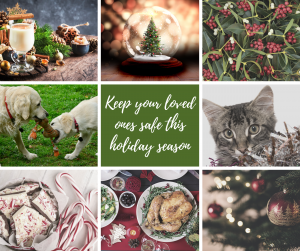Tips for a Safe Holiday Season

The holidays are a special time for celebration and looking towards the New Year. Now more than ever we need a time to relax and unwind!
In order to avoid spoiling your holiday cheer with a visit to the vet, here are a few things to keep in mind.
- Chocolate and Artificial Sweeteners: Chocolate toxicity is one of the most common reasons for pet emergency visits over the holidays. Other candies could contain sweeteners, such as xylitol, which are also highly toxic to animals.
- Pancreatitis: Good food is one of the best parts of the holidays! While it’s fun to share the season with your pets, avoid feeding them foods such as fatty meat trimmings, turkey, gravy, or other rich items as these foods can lead to pancreatitis. Symptoms may include vomiting, abdominal pain, significant dehydration, or other life-threatening symptoms.
- Alcohol: Be sure to keep your alcoholic beverages out of the reach of your pets. Ingesting alcohol can cause issues ranging from vomiting and diarrhea to more severe issues.
- Wounds & Injuries: To help your pet avoid injuries over the holidays- from fights with other pets to a surprise run out the door to stepping on a broken ornament- provide them with a calm, safe, and secure environment as much as possible.
- Foreign Bodies: As if there isn’t enough trouble with food around the holidays, there are plenty of other objects your pet may ingest from ornaments to bones to tinsel to toys. While some objects may be able to pass on their own, others may cause a blockage requiring immediate attention and/or surgical removal. As possible, keep an eye out to make sure your pet isn’t eating anything they shouldn’t be.
- Plant Toxicity: Surprisingly enough, many of the common decorative holiday plants are toxic to pets. Plants or decorations which may cause problems if ingested include poinsettia, mistletoe, ivy, lilies, potpourri, holly, amaryllis, hellebore and pine needles.
- Hidden Dangers of Snow Globes: Did you know that snow globes are filled with ethylene glycol, commonly known as antifreeze? Antifreeze is both temptingly sweet and highly toxic to pets.
- Lights and Candles: Your pets may find your beautiful lights and candles as beautiful as you do, but unfortunately they may express their enjoyment through chewing. To keep your furry friends safe, unplug lights when not in use and avoid leaving them alone with candles to minimize unpleasant surprises.
With these tips and tricks in mind, we wish you and your pets a safe and relaxing holiday season! Happy New Years from our team at Sentinel Veterinary Specialists and Emergency!
